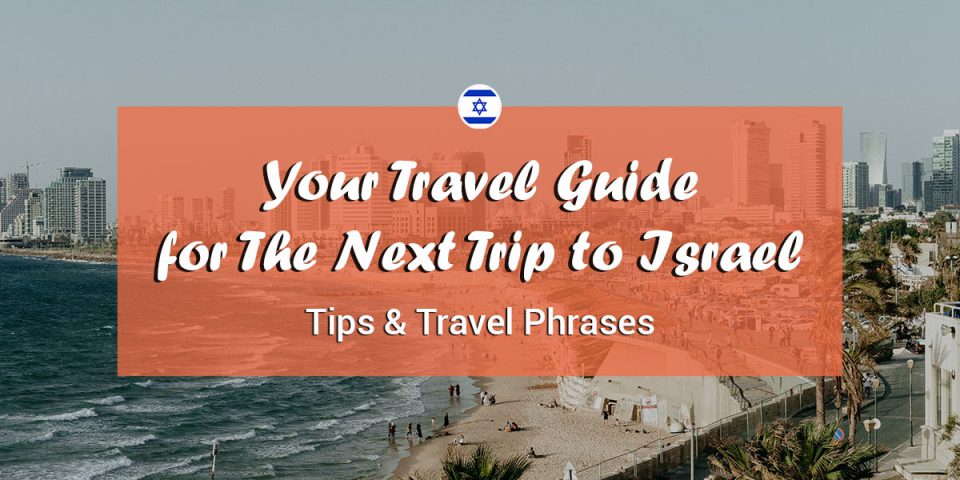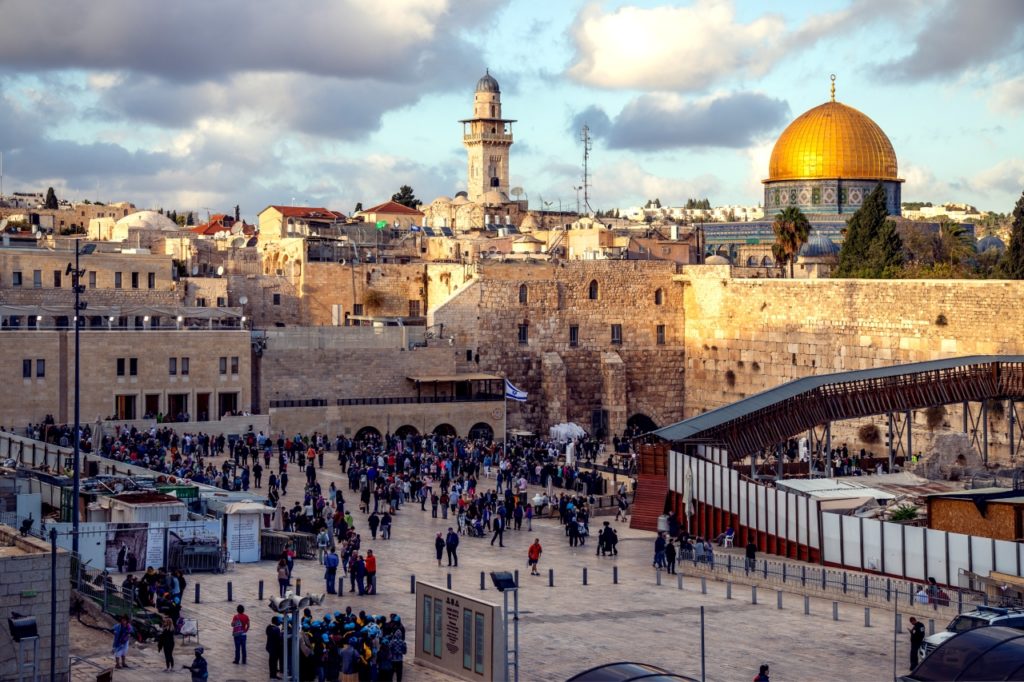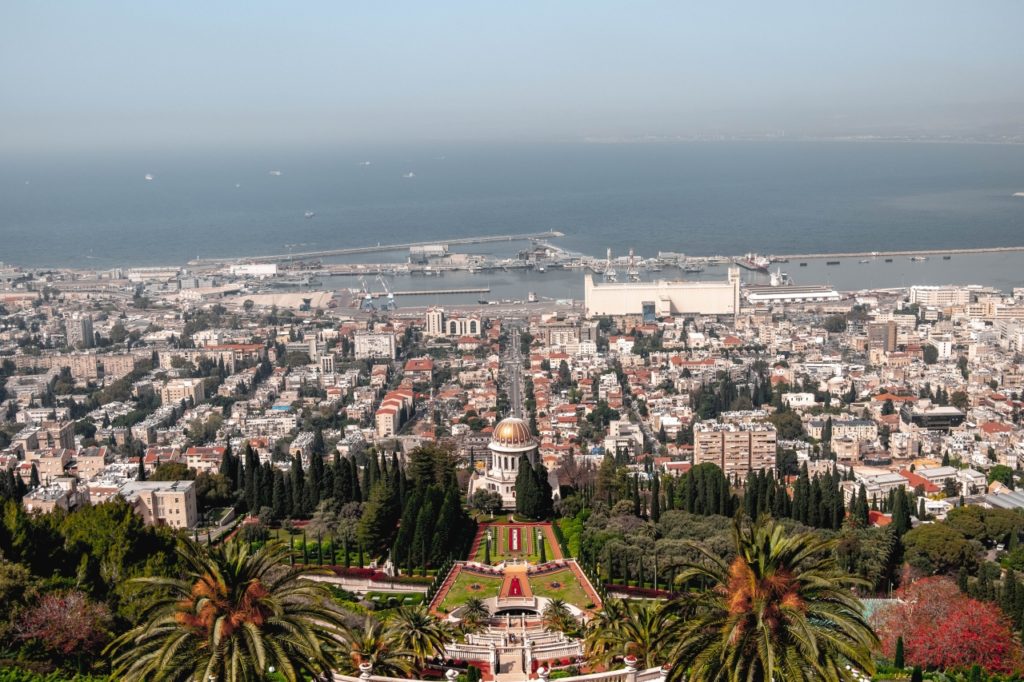The Benefits of Multilingualism
Learning multiple languages is extremely rewarding inside and out of business.
From weather, typical costs to Hebrew words and Hebrew phrases every traveler needs to know, here is the ultimate travel guide for your next trip to Israel.

There are few places on Earth as magic and as contrasting as The Holy Land of Israel. From finding God within the ancient walls of Nazareth and Jerusalem, you can then experience the vibrating nightlife and stunning beaches of Tel-Aviv, praise the beauty of the Bahá’í Gardens in Haifa, float quietly in the arms of the Dead Sea or get lost in the immensity of the Negev Desert. It’s a dream. You’ll love every piece of this land and you’ll even want to come back.

Of course, as you already know, every travel destination has its downsides. You won’t like every aspect of traveling to Israel. But that’s only natural. To voice your concerns: yes, knowing the history of Israel, it’s important to keep safety in mind, but you must not let it control you.
So here are some tips and all the basic Hebrew phrases you need to know before packing your bags for the long-awaited trip to Israel.
The best time to go to Israel: If you want to sunbathe on the beaches of Tel Aviv or snorkel in Eilat, the best time to go to Israel is between June and September. On the other hand, if you are a person that feels more comfortable with lower temperatures, the periods between April – May and October-November are the best for you to explore the country and spend time in Jerusalem. However, during these months you should pack clothes that you can wear in layers because the weather can change fast from really sunny to cold and vice-versa.
Don’t forget to: Pack various clothing items for multiple occasions and be mindful of what you wear. As a sign of respect towards all the religions that shake hands in the Holy City, it would be advised to follow the unspoken rules and always have scarf or shawl ready in case of an “emergency” visit to a holy site. While in Tel Aviv you can wear anything you want, in Jerusalem and Nazareth modesty is expected.
Language: Hebrew is Israel’s official language. Almost everybody speaks Hebrew as a first or second language. That is why you should stick around until the end of the article and learn the basic Hebrew words and phrases we have selected for your trip to Israel.
In addition to Hebrew, you will also hear Arabic (about one-fifth of the population is constituted by the Arab minority) and, of course, English. Not everybody speaks perfect English in Israel, but they certainly try. Since tourism is a central part of the country’s economy, shop, pub and restaurant owners try to keep the channel of communication open with the tourists.

Weather: Since Israel is a Mediterranean country, the weather is a sweet summer dream for everyone who loves the sun. During summer, the temperatures usually hover around 80 °F (27 °C) and 90 °F (32 °C). Spring and autumn are a little cooler at around 60 – 70 °F (15 – 25 °C) during the day in most cities and 40 – 50 °F (5-10 °C) during the night in Jerusalem. During the winter, the temperatures go as low as 40 °F (5 °C) in Jerusalem and 50 – 60 °F (10 – 15 °C) in the rest of the country.
Getting around: Lucky for us tourists, public transport in Jerusalem is great. The tram usually runs from one side of the city to the other and there are companies that offer minibus shuttle transfers between a lot of destinations. But if you want an even more comfortable way of getting around, Uber has a brother in Israel and his name is Gett.
Currency: The currency of Israel is the Israeli Shekel ₪ (ILS). One dollar is 3.51 ILS and one euro is 3.88 ILS.
Just to be sure, our advice would be to have at least half of your vacation money in cash. Depending on the city you are visiting, paying with a credit card may not be an option.
Typical costs: As many people say, Israel is not a cheap destination. For example, a three-course meal for two people at a mid-range restaurant is around 220 ISL (51.46€ or $62.53). That’s quite pricey. However, if you are on a tight budget, you can limit yourself to eating fast-food which is typically cheaper is most countries. Lose the potatoes, keep the meat and the green vegetables and you’ve made yourself a pretty decent meal.
A good reference point that can help you compare typical costs around the world is the water bottle. In Israel, a water bottle is €4.20 (1.5-liter bottle) in stores and around €1.72 (0.33-liter bottle) in most restaurants and cafés. Compare that to Greece, where the same water bottles are €0.50 in stores and around €1 in most restaurants and judge for yourself.
Find out even more details about typical costs in Israel right here.
Now that you know some of the most important tips and insights about vacationing in Israel, let’s continue with some basic Hebrew words you will probably need during this amazing trip to Israel:
Before moving on to the Hebrew travel phrases that will make your vacation ten times better (yes, learning the language of the natives does that!), let’s discover the top five most beautiful places in Israel. Like we already mentioned, this country is a dream. From beaches to gardens and holy sanctuaries. So let’s discover the most beautiful of them.
Even if you are not a believer, Jerusalem and Nazareth are still a must. In addition to their great religious value, these cities are rich in art, culture and thousands of years of history. You’ll undoubtedly love every minute spend exploring their streets and never forget your experience there.
If you are a sucker for beaches, parties, museums and 1930 Bauhaus buildings, Tel-Aviv is the place to go. With its open-minded, diverse society, you’ll find Tel-Aviv surprisingly different than what you may have had in mind. For example, some of the most important events taking place in Tel-Aviv yearly are Gay Pride Parade, Purim Street Party and Tel Aviv Fashion Week. Cool, isn’t it?

With its surface and shores at 1,412 ft (430.5 meters) below sea level, The Dead Sea is Earth’s lowest elevation on land. With only that fact in mind, The Dead Sea immediately becomes a must-see place not only for Israel but for the entire world. On top of it all, it is also one of the world’s saltiest bodies of water.

When you’ll first see Bahá’í Gardens, you’ll feel like you’ve stepped out of reality. That’s how beautiful this place is. Spread almost a kilometer up Mount Carmel, The Terraces of the Bahá’í Faith include design elements inspired from the Persian gardens in Iran, the Nishat Bagh gardens in India and English gardens.
World’s largest erosion crater, Ramon Crater or Makhtesh Ramon is 40 km long, between 2 and 10 km wide and about 500 meters deep. It is shaped like a long heart and it offers a breath-taking view to any traveler brave enough to leave the safety of the cities and adventure to the wilderness.
Other cool places in Israel that deserve your attention: Eilat, Sea of Galilee, Golan Heights, Acre’s Old City, Bethlehem.

Last but not least, our favorite part of any vacation in a foreign destination: learning the travel phrases.
Traveling can be both amazing and stressful. What if you lose your luggage? What if you need to go to the toilet but you don’t know where to find one? What if nobody speaks English? Avoid stressful situation like these. Language should never be a barrier. Learn these basic Hebrew phrases beforehand and enjoy your trip to the fullest.
First, we will explore Hebrew greetings, continue with some common ways to ask for help in Hebrew, basic phrases for when you’ll go to an Israeli restaurant and some basic phrases for shopping sprees. Happy learning!

Do you want to practice what you’ve learned and maybe learn some more Hebrew? Check Mondly, the revolutionary language learning platform that makes language learning fun, fast and easy! Mondly is a pocket-held language tutor that allows you to put your brain on autopilot and enjoy the ride to fluency in 33 languages. By combining solid neural science, cutting edge technologies, bite-sized Daily Lessons and a gamified experience guaranteed to make you addicted to learning languages, Mondly gets you fluent faster than you could ever imagine.
Start using Mondly for free on your computer or tablet or, better yet, download the Mondly app on your iOS or Android device and learn languages fast anytime, anywhere.
Do you want to learn Hebrew with Mondly in just 10 minutes a day?

Learning multiple languages is extremely rewarding inside and out of business.

We’ve all heard of brain training. The science behind it is widely accepted, but what are its main benefits?

Learning a foreign language is good for kids but how do they do it so easily? Here’s what science says about the cognitive advantages of